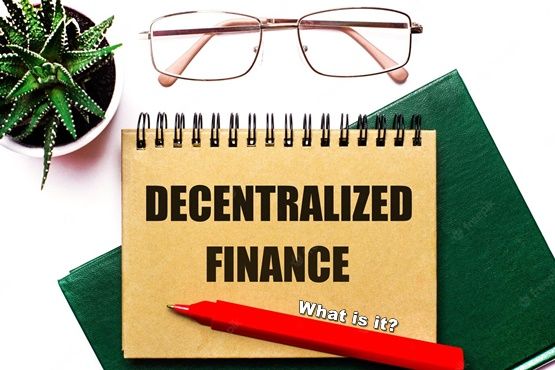What is DeFi ? Here is a quick but complete definition of what decentralized finance is, DeFi.

What is DeFi? DeFi (for « Decentralized Finance ») is a movement that aims to create alternatives to traditional finance using blockchain and smart contract technologies. This ecosystem aims to create financial systems that are open, transparent, and accessible to everyone, regardless of their geographic or financial location.
What is DeFi?
Traditional finance vs. DeFi:
- Traditional Finance: Refers to existing centralized financial systems, in which banks, financial institutions and intermediaries play a crucial role in managing transactions, loans, there are also cryptocurrency exchanges and various other financial services.
- DeFi (Decentralized Finance): Conversely, DeFi represents a new paradigm that leverages blockchain technology to create an open, permissionless and decentralized financial ecosystem. It aims to replace or enhance traditional financial services by cutting out intermediaries and enabling direct peer-to-peer interactions.
DeFi – definition:
DeFi projects often include lending platforms, crypto-currency exchange protocols, payment systems and security protocols. These projects are often built on the Ethereum blockchain, as it offers a wide range of smart contract features that enable complex financial systems. Moreover, we invite you to discover the DeFi news, as you will regularly find new and interesting projects.
The term « decentralized finance » was popularized in the 2010s with the appearance of the first cryptocurrency, Bitcoin, which was launched in 2009. Since then, many decentralized finance projects have emerged, each aiming to provide financial services in a more open, transparent and secure way using blockchain technology.
This ecosystem is vast, with many different types of companies operating, for example, in trading, as a decentralized trading platform, or in travel, gaming, sports, real estate and many other areas.
Key Characteristics of DeFi:
Blockchain-Based: DeFi platforms operate on public blockchains like Ethereum, Binance Smart Chain, or Solana.
Open and Permissionless: Anyone can participate without needing approval or intermediaries.
Smart Contracts: DeFi applications use smart contracts to automate processes, enforce rules, and manage assets.
Interoperability: DeFi protocols can interact with each other, creating a seamless ecosystem.
Liquidity Pools: DeFi platforms often rely on liquidity pools for trading and lending.
Here’s an overview of what these projects may include:
- Decentralized lending and credit platforms that allow users to lend or borrow money without going through a traditional financial institution.
- Price stabilization protocols that fix the price of certain cryptocurrencies and minimize fluctuations in their value.
- Token lending and borrowing platforms that allow users to lend or borrow tokens (for example, stablecoin tokens) using blockchain technology.
- Decentralized trading platforms that allow users to trade directly with each other, without going through a centralized intermediary.
- Decentralized payment platforms that allow users to send and receive payments using blockchain technology.
Examples of DeFi Applications:
Decentralized Exchanges (DEXs): Platforms like Uniswap, Sushiswap, and PancakeSwap allow users to trade cryptocurrencies directly without intermediaries.
Lending and Borrowing: DeFi platforms like Compound, Aave, and MakerDAO enable users to lend or borrow digital assets.
Stablecoins: Stablecoins (e.g., USDC, DAI) are pegged to a stable asset (usually USD) and facilitate DeFi transactions.
Yield Farming: Users can earn rewards by providing liquidity to DeFi protocols.
Insurance: DeFi insurance platforms like Nexus Mutual offer coverage against smart contract vulnerabilities.
Staking: Staking is an essential element of DeFi (decentralized finance). DeFi staking involves locking your crypto assets into a smart contract in exchange for rewards and to generate passive income.
Challenges and Risks:
Security: Smart contract vulnerabilities can lead to hacks or exploits.
Regulatory Uncertainty: DeFi operates in a regulatory gray area.
Liquidity Risks: Some DeFi tokens may suffer from low liquidity.
Market Volatility: DeFi assets can be highly volatile.
In summary, DeFi represents a disruptive shift toward decentralized financial services, offering greater accessibility, transparency, and control. However, users should exercise caution and conduct due diligence when participating in DeFi projects.

17 commentaires sur « What is DeFi ? »
Les commentaires sont fermés.